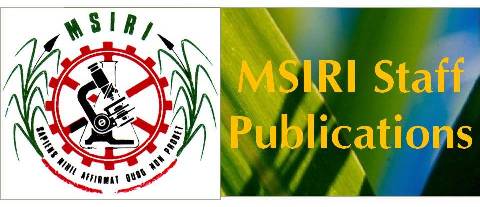Integrated weed management: strategies to reduce costs and amount of herbicides in the Mauritian sugarcane industry
| MSI07P4240 | |
| Seeruttun, S. Barbe, C. Ismael, F. Gaungoo, A. | |
| Integrated weed management: strategies to reduce costs and amount of herbicides in the Mauritian sugarcane industry | |
| Programme, Abstracts and List of participants. ISSCT Agronomy workshop: Integrated agronomic practices to improve/sustain cane productivity, 22-26 May 2006, Sofitel Raja Orchid Hotel, Khon Kaen, Thailand. | |
| ISSCT Agronomy workshop: Integrated agronomic practices to improve/sustain cane productivity, 22-26 May 2006, Sofitel Raja Orchid Hotel, Khon Kaen, Thailand. | |
| book chapter | |
| 2006 | |
| p. 36 | |
| En | |
| En | |
| In Mauritius, weed control in sugar cane is achieved quite successfully by application of two or more herbicide treatments often complemented by some manual weeding. However, the average annual weed control costs per hectare exceed US$ 200; some growers in the humid areas even spend more than US $ 500 per hectare on this operation. The average amount of active ingredient used per season has decreased within the last fifteen years but still represents more than 7 kg a.i. ha-1. A project to develop integrated weed management strategies was initiated in 1998; the main objectives were to reduce the amount of herbicides and labour. The integrated approach designed is based upon the critical periods of weed competition. Field studies have shown that, in the worst scenarios, weed competition started six to eight weeks after planting or harvest (WAP/WAH) and ended between 20 to 28 WAP/WAH. Field trials have also revealed that the upper limit of the critical periods can be reached four or more weeks earlier if cane is planted in `Dual Rows' (high density planting). In plant cane, mechanical weeding would cost-effectively replace at least one herbicide application while adoption of green cane trash blanketing (GCTB) would be advantageous in ratoon cane. Where GCTB is not possible, the new approach recommends delaying the traditional first pre-emergent herbicide treatment until onset of the critical periods; a new pre- and post-emergent herbicide treatment consisting of a tank-mix of amicarbazone and trifloxysulfuron+ametryn has been found to provide excellent control of almost all emerged weeds with a relatively long residual activity. Preliminary results have shown no significant increase in weed seedbank with this weed management approach which has now been recommended to the growers. | |
| sugarcane weed control integrated weed management amicarbazone trifloxysulfuron ametryn Critical periods of weed competition mechanical weeding herbicides costs | |
| Mauritius | |
| Sugarcane: Weeds, weed control and management | |
| Herbicides | |
| 2007-02-23 | |
| En | |
| LST | |
| CoWA |
